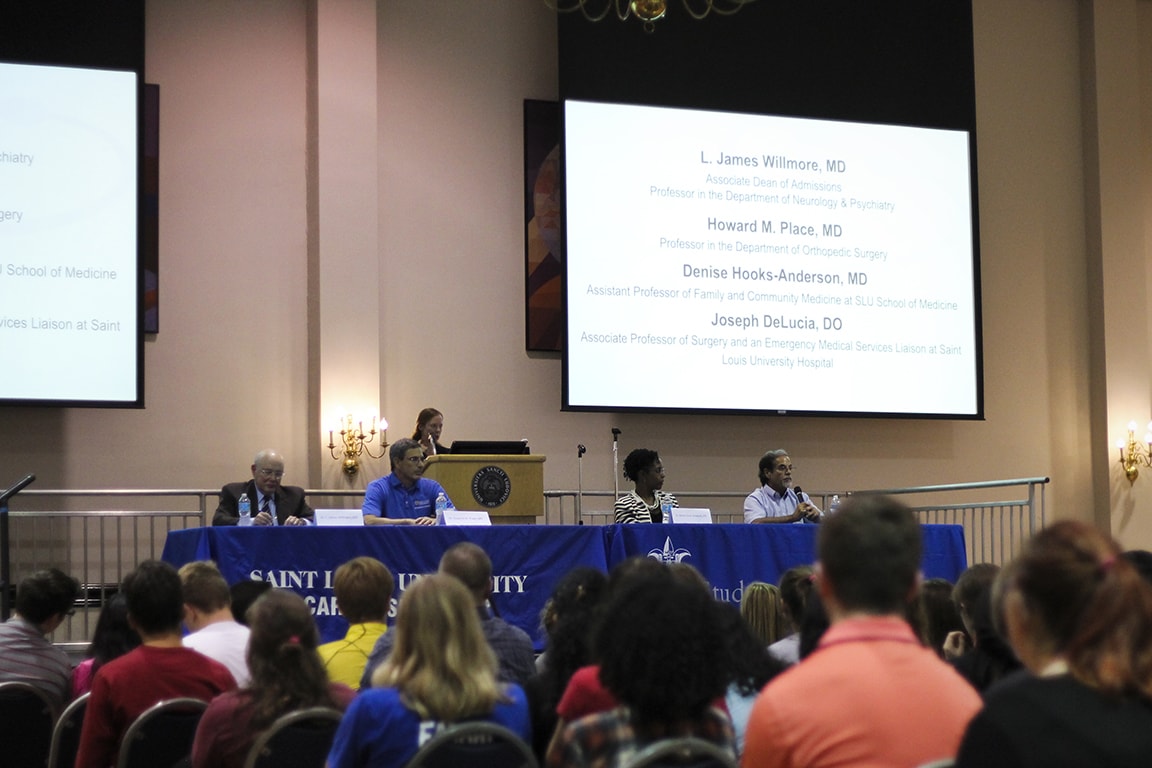How to Get into Med School: Students Hear What It Takes
Last semester, the Saint Louis University Pre-Health and Pre-Law Office and Career Services hosted a panel of four physicians to discuss the medical school admissions process and give their advice to prospective medical students.
L. James Willmore, M.D., associate dean of the School of Medicine; Howard M. Place, M.D., orthopedic surgery; Denise Hooks-Anderson, M.D., family and community medicine; and Joseph DeLucia, D.O., of emergency medicine served on the panel.
Members of Alpha Epsilon Delta, the premedical honor society, and the Pre-Health and Pre-Law office kicked off the event by asking a series of questions before opening it up to the audience.
Students, anxious to learn how to succeed, repeatedly inquired about the right combination of grades, volunteer and service hours and research opportunities that could hold the magic formula to an acceptance letter.
Grades are important. Knowledge and skill in the sciences is a fundamental aspect of studying medicine, so it makes sense that applicants are expected to do well in their science courses. However, it is not required that students only study the sciences during their undergraduate degree.
Choosing a major that forms a passion for learning is critical. Passion helps drive the success of students who are interested in their courses and, generally, for pre-med students this passion is in the sciences. Place encouraged students to take something that excites them and use it to drive their learning. He shared the example of his nephew, who majored in Spanish, before applying to medical school. Being bilingual can be an asset.
Experience outside of the sciences provides applicants with the opportunity to interact with people. DeLucia told the group that being a physician is a “blue collar job.” Doctors don’t spend much time sitting around and are instead interacting with people and serving their patients.
Hooks-Anderson emphasized the importance of remembering the humanity in medicine. “It doesn’t matter how smart you are if you can’t relate to patients,” she said.
Willmore emphasized the importance of service work and shadowing physicians in various specialties while reducing the role of undergraduate research. “No one should do research just because they think it is what they ought to do,” he said.
For those aspiring to pursue a career in medical research, exploring research opportunities is a critical component of the undergraduate experience and solidifying career interests.
The path to becoming a physician is long one, requiring many years of education. Prospective doctors can find an alternative route into medicine, such as getting additional education or pursuing volunteer or business entrepreneurship opportunities.
DeLucia worked as a nurse before attending college for osteopathic medicine. Osteopathic doctors are trained with a more holistic approach and tend to place greater emphasis on manipulative medicine such as exercise, physical therapy, and respiratory therapy as treatment methods.
Not everyone gets accepted into medical school on their first application. Place advised students to always keep their options open and continue to work on improving themselves.
The panel also shared several dos and don’ts based on their personal experience for prospective medical school students. They included:
- Do study what interests you. Willmore and Hooks-Anderson both agreed students who studied outside of the sciences have a history of being some of the most interesting and enjoyable students to meet.
- Do get good grades.
- Do keep an open mind and don’t decide on a specialty too soon. Explore different areas of medicine.
- Do focus on volunteering and service.
- Do use extracurriculars to work with others.
- Do remember the humanity in medicine.
- Do commit yourself to lifelong learning. Medicine is constantly innovating. Good physicians keep learning.
Information provided by Ellen Hutti, a SLU sophomore who attended the event.


















